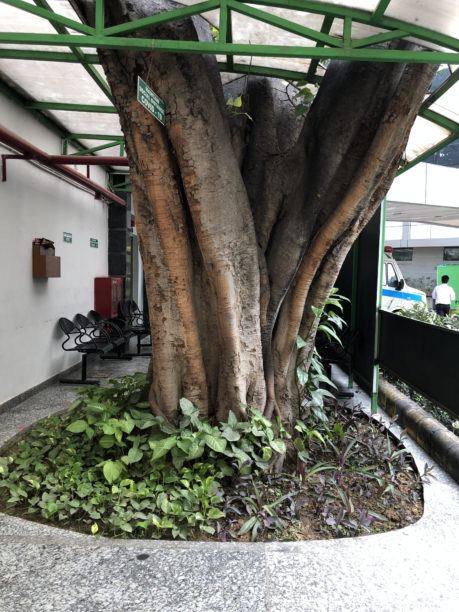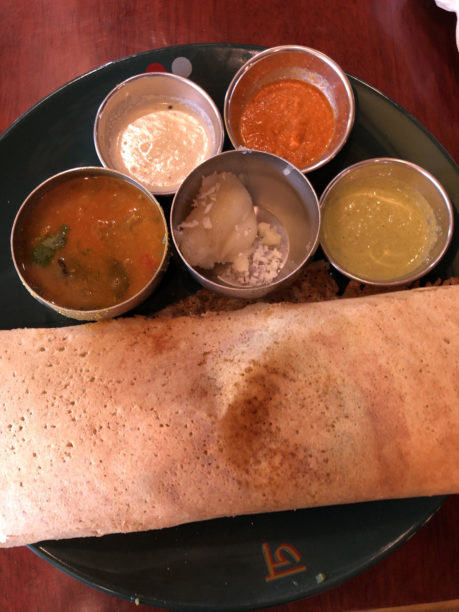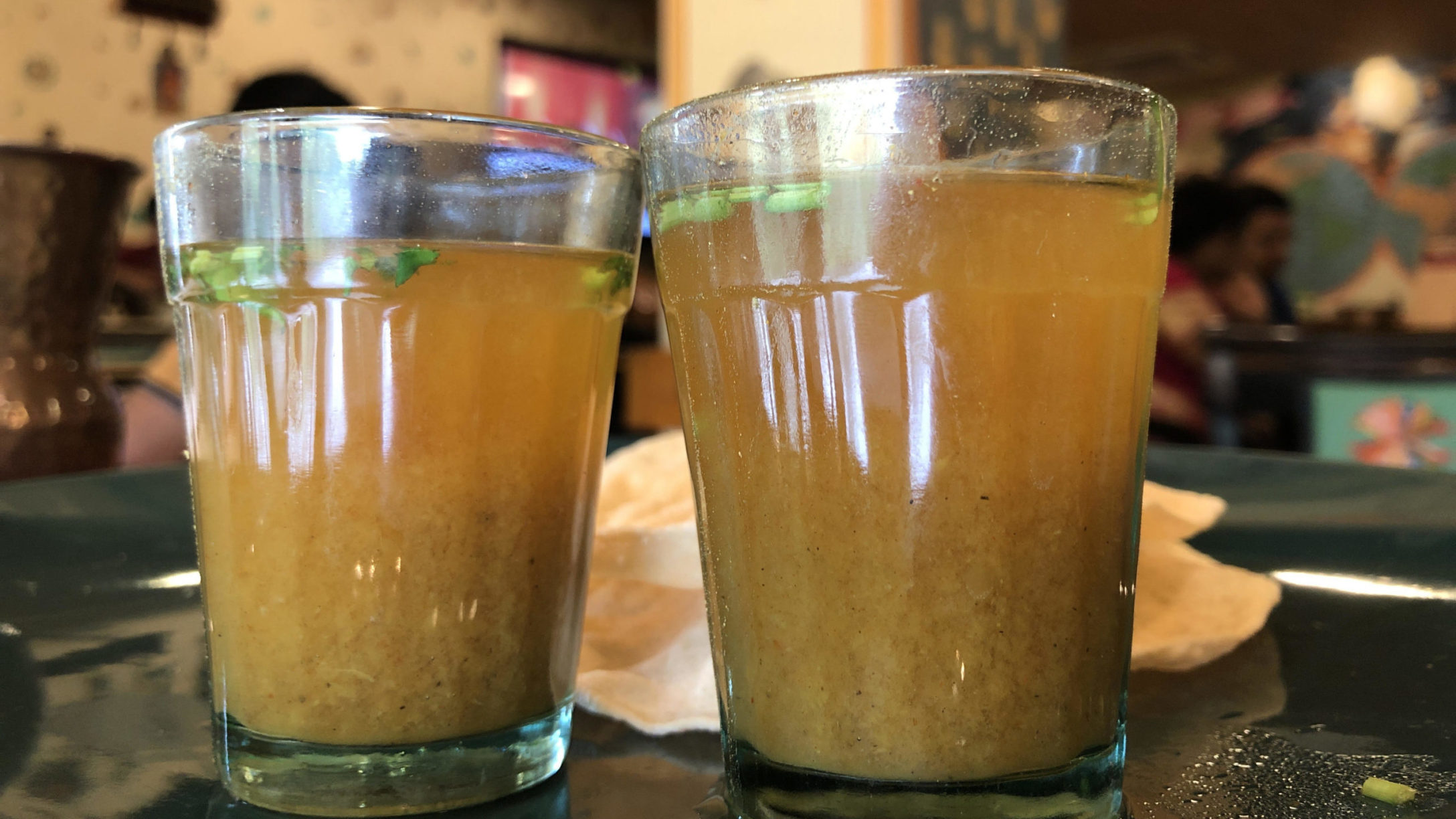South Delhi
September 18, 2021
We mechanically booked a cab and headed for M’s second shot of AZ. I was underslept and grumpy. The vaccination centre was in the same hospital where, last month, my mother and I had our full body check-ups. While M waited his turn, I headed outside for a walk along the hospital’s perimeter. Behind M, a curmudgeonly old couple were waiting. The queue began and ended with them.

Nearby, a giant peepal tree attracted me; on our visit last month, my mother had admired its girth as we sat at a distance and gazed. On my approach I noticed a gardener perched on its vast trunk, plucking away at dead leaves and branches. He was sad, he said, to see that someone had sprayed the chewed remains of betel nut and tobacco on the leaves of his beloved money plant. “No matter what, I can’t wash off the stains,” he mumbled.
I made my way through a small garden with circular walkways at the front entrance of the hospital, and crossed through. Heading out the back gate, I found an old Shiv Temple, a Durga Temple, and a cluster of men idling, chatting, reading the Hindi morning newspapers, and smoking cheap cigarettes. A spiralling staircase outside a small office building caught my curiosity. I took a shaky photograph of it and sped back in to find the freshly jabbed M waiting for me in the compound.
The dashboard of our cab home boasted an elaborate if minimalistic temple, dedicated to the elephant god Ganesh. Marigolds and Bael leaves adorned the deity’s idol, their smell perfuming the cab’s interior; we rolled down the windows and allowed the fumes of nearby cars to cake the exposed parts of our bodies. The radio cackled meaninglessly in the background as the driver chatted with his son on the phone. I texted good morning to my mother and stared at the unblinking screen for a while.
At the Juggernaut, a nearby restaurant famous for its Tamil Nadu cuisine, we waited again. It was only 10 in the morning, and other early risers were already gorging on the ghee roast, masala dosai and masala vadai. In the meantime, I strolled around in the market looking at the shops still in their nice and shiny early morning glory. An Uber horn blasted at a couple of cows soaking in the sun, breaking the tranquillity. A few grocery stores of various shapes and sizes, and makeshift stalls selling fresh dairy products, vegetables, and fruits stretched out on the road. I walked up to the nearest medicine store, still not quite open; a string held the two panels of the door loosely together, politely suggesting that no one was yet allowed to enter. Following covid restrictions, now nearly a year old, I gathered my shopping and paid using the barcode pasted on the glass outside.
A scratchy recording of Satyajit Ray’s Charulata theme vibrated from the speakers in the lobby of the restaurant. Once inside, we were pleasantly surprised with a swift and sudden shift in gears; live tabla and sitar music filled the fragrant space. I smiled as emotion welled up in me, and then held back a surge of tears. Live Hindustani classical music has been my benediction since childhood.

For breakfast, we had the panacea for all of life’s ills: masala dosa, idlis and filter coffee. If the music transported me to my childhood, the feast brought back memories of the year I spent at journalism school in the south Indian megacity of Chennai. In an ineffable, atmospheric way, this breakfast was more moving to me than entire vacations.
As we stepped out, our backs instantly slicked over with sweat in the unseasonably hot late September morning, dissolving all joy and satisfaction. Our third cab took us to the mall, to pick up our engagement rings. On the way, M and I chatted about how, despite the close and crowded proximity of these three parts of south Delhi, the neighbourhoods seemed to change almost fully with every bend in the road.
Through the rolled-down window of the cab I saw the myriad hues of a September morning in Delhi slowly returning to the look and rhythms of pre-covid times. Traffic snarls, weaving SUVs, angry drivers all made still angrier by the unusually hot morning, but also a quiet corner on the roadside where a woman sat on a discarded car-shaped sofa under the shade of a tree and gorged on a slice of papaya; a man quietly enjoying the solace of a glass of water from a roadside earthen pot; the heedlessness of a bunch of girls dressed in H&M, deboarding a posh sedan and entering a leafy enclave.
As M ambled along the corridors, scrolling on his phone, or window shopping at a bookstore, I was quietly thrilled to be amid this multitude of interesting, unfamiliar faces. Instinctively, my feet did a little dance of joy as I heard Harry Sandhu and Jasmine Sandlas’ highly original banger Illegal Weapon burst from the speakers and shake the floors. The cacophony, the woolly love-in, the friendly humidity of being amid a throng of people that I had missed for about 18 months returned.
The deadly second wave had reneged on the naive promise that anything would ever really come back to pre-covid terms. Now seeing people (assuming that they were fully or partially vaccinated) following the beats of their “normal” urban lives made me giddy with a new kind of glee. Though there still existed a sharp caution that sliced us apart from one another, with everyone conscious of a minimum social distance, whatever that means in a country with a population the size of ours.
This was a routine that M and I had followed frequently in the months before March 2020. Now as we synced ourselves back into the sweetly ordinary comings and goings of our time outdoors together, I felt a softness unlock within.
As we waited for the fourth cab, I stared at M, admiring his new post-lockdown haircut as the creases around his eyes relaxed; he waved at the approaching cab driver. Locking my fingers with his, I gently tugged at his arm and in that brief moment, it finally felt like it was over.






